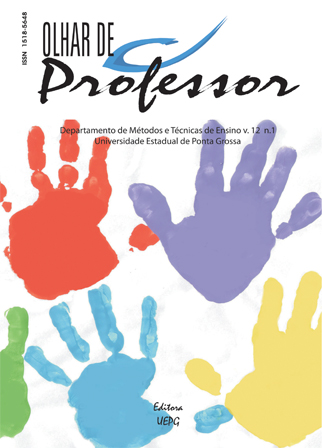A AUTOBIOGRAFIA COMO FONTE DE INVESTIGAÇÃO HISTÓRICA PARA A EDUCAÇÃO - Doi: http://dx.doi.org/10.5212/OlharProfr.v.12i1.033055
Main Article Content
Abstract
Este artigo propõe uma reflexão sobre o uso de
registros de memória, em forma de relatos autobiográficos,
como fontes para a construção histórica, especialmente
em procedimentos de investigação relacionados
à Educação. Para tanto, será tomado como objeto de
análise a obra A Língua Absolvida (Die Gerettete Zunge),
de Elias Canetti, que enfoca os processos de formação de
um intelectual do início do século XX. Como referencial
teórico para a construção da pesquisa, buscou-se apoio
em autores como Jacques Le Goff, Pierre Nora, Michael
Pollak e Maurice Halbwachs, que investigam as interfaces
possíveis entre memória e história, e em Pierre Bourdieu
e Viñao Frago, que discutem o uso da biografia, ou da
autobiografia, como fonte para a construção histórica.
Quanto aos procedimentos metodológicos, teve-se como
parâmetro a experiência de Kleber Campos sobre temática
análoga.
Downloads
Article Details
Authors who publish in this journal agree with the following terms:
a) Authors keep the copyrights and concede the right of its first publication to the magazine. The work piece must be simultaneously licensed on the Creative Commons Attribution License which allows the paper sharing, and preserves both the author identity and the right of first publication to this magazine.
b) Authors are authorized to assume additional contracts separately, to not-exclusively distribution of the paper version published in this magazine (e.g.: publish in institutional repository or as a book chapter), with the author identity recognition and its first publication in this magazine.
c) Authors are permitted and stimulated to publish and distribute their papers online (e.g.: in institutional repository or on their personal webpage), considering it can generate productive alterations, as well as increase the impact and the quotations of the published paper.
d) This journal provides public access to all its content, as this allows a greater visibility and reach of published articles and reviews. For more information on this approach, visit the Public Knowledge Project, a project that developed this system to improve the academic and public quality of the research, distributing OJS as well as other software to support the publication system of public access to academic sources.
e) The names and e-mail addresses on this site will be used exclusively for the purposes of the journal and are not available for other purposes.

This work is licensed under a Creative Commons Attribution 4.0 International License.





